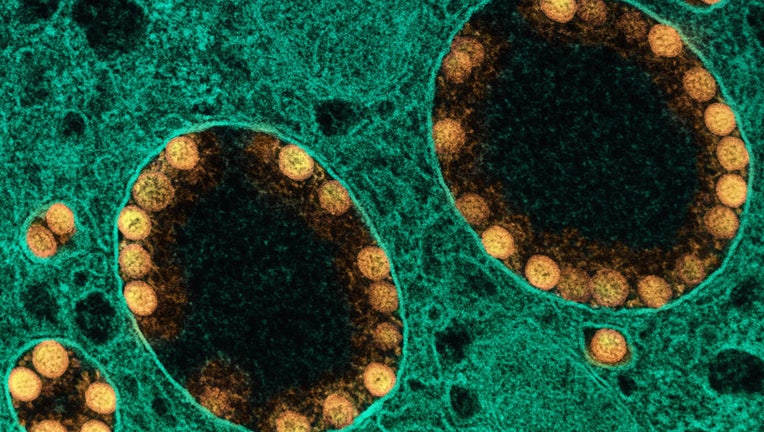WSU researchers discover 'COVID-like' virus immune to current vaccines

FILE -Transmission electron micrograph of SARS-CoV-2 virus particles (gold) within endosomes of a heavily infected nasal Olfactory Epithelial Cell. (NIH/NAID/IMAGE.FR/BSIP/Universal Images Group via Getty Images)
PULLMAN, Wash. - Researchers at Washington State University discovered a new COVID-like virus in Russian bats that, if it infected humans, would resist current vaccines.
The virus is named "Khosta-2," and was discovered by researchers at WSU’s Paul G. Allen School for Global Health.
Their research was published in the PLoS Pathogens journal.
They found that spike proteins in the virus can infect human cells, and is resistant to both monoclonal antibodies and serum from people vaccinated from SARS-CoV-2, tge virus that causes COVID-19.
According to WSU researchers, both Khosta-2 and SARS-CoV-2 belong to the same subcategory of coronaviruses, called "sarbecoviruses."
"Our research further demonstrates that sarbecoviruses circulating in wildlife outside of Asia – even in places like western Russia where the Khosta-2 virus was found – also pose a threat to global health and ongoing vaccine campaigns against SARS-CoV-2," said WSU virologist Michael Letko.
Hundreds of sarbecoviruses have been discovered in recent years, and most are incapable of infecting human cells. Letko says this underscores the need to for general sarbecovirus vaccines, rather than vaccines for specific variants, like COVID-19.
"Right now, there are groups trying to come up with a vaccine that doesn’t just protect against the next variant of SARS-2 but actually protects us against the sarbecoviruses in general," Letko said. "Unfortunately, many of our current vaccines are designed to specific viruses we know infect human cells or those that seem to pose the biggest risk to infect us. But that is a list that’s everchanging. We need to broaden the design of these vaccines to protect against all sarbecoviruses."
Letko and WSU faculty studied Khosta-1 and Khosta-2, but the latter was more concerning. According to their findings, Khosta-2 can infect human cells by attaching its spike protein to a receptor protein in the body.
RELATED: Gov. Inslee announces COVID-19 state of emergency to end Oct. 31
Get breaking news alerts in the FREE FOX 13 Seattle app. Download for Apple iOS or Android. And sign up for BREAKING NEWS emails delivered straight to your inbox.
Using serum from people vaccinated for COVID-19, researchers saw Khosta-2 was not neutralized by current vaccines. Additionally, antibodies from people infected by the Omicron variant were ineffective, as well.
"When you see SARS-2 has this ability to spill back from humans and into wildlife, and then there are other viruses like Khosta-2 waiting in those animals with these properties we really don’t want them to have, it sets up this scenario where you keep rolling the dice until they combine to make a potentially riskier virus," said Letko.

